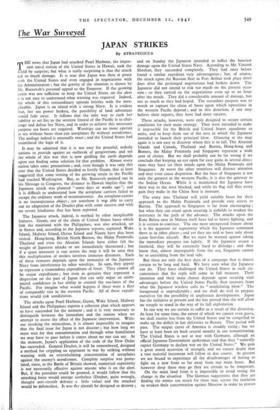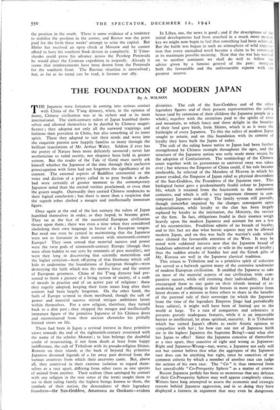rhe War Surveyed
JAPAN STRIKES
By STRATEG ICUS
THE news that Japan had attacked. Pearl Harbour, the impor- tant naval station of the United States in Hawaii, took the world by surprise; but what is really surprising is that the attack did so much damage. It is true that Japan was then at peace with the United States and even engaged in negotiations with the Administration ; but the gravity of the situation is shown by Mr. Roosevelt's• personal appeal to the Emperor. If the growing strain was not sufficient to keep the United States on the alert it is not easy to understand what warning was required. Indeed, the whole of this extraordinary episode bristles with the inex- plicable. Japan is an island with a strong Navy. It is evident that, her sea power broken, the possibility of land adventure would fade away. It follows that the only way to curb her liability to set fire to the western littoral of the Pacific is to chal- lenge and defeat her Navy, and in order to achieve this necessary purpose sea bases are required. Warships can no more operate at sea without bases than can aeroplanes fly without aerodromes. The analogy indeed is unusually exact ; and the United States had assimilated the logic of it.
It may be admitted that it is not easy for peaceful, orderly nations to provide against an outbreak of gangsterism; and yet the whole of this war that is now girdling the earth depends upon our finding some solution for that problem. Almost every nation takes some precautions ; and, even though it was only this year that the United States decided to fortify Guam, this at least suggested that some sensing of the growing strain in the Pacific had reached Washington. But, as Mr. Roosevelt pointed out in his Message to Congress, the distance to Hawaii implies that the Japanese attack was planned " some days or weeks ago "; and it is difficult to understand how the aeroplane carriers failed to escape the ordinary work of reconnaissance. An aeroplane-carrier is no inconspicuous object ; yet somehow it wis able to carry out an adaptation of the Douhet plan with some success and with no severe hindrance that has been reported.
The Japanese attack, indeed, is marked by other inexplicable features. Guam, one of the chain of United States bases which link the mainland with the Philippines, was also attacked, set in flames and, according to the Japanese reports, captured. Wake Island, Midway Island, Ocean Island and Nauru have also been visited. Hong-kong, British North Borneo, the Malay Peninsula, Thailand and even the Aleutian Islands have either felt the weight of Japanese attacks or are immediately threatened ; but if a space measurer is run across the map it will be seen that this multiplication of strokes involves immense distances. Each of these ventures depends upon the immunity of the Japanese Navy from interference by other warships. In sum, they appear to represent a tremendous expenditure of force. They cannot all be major expeditions ; but even as gestures they represent a dispersion on the part of Japan that can only argue an unim- paired confidence in her ability to control the sea-lanes of the Pacific. For imagine what would happen if there were a fleet of comparable size in the western Pacific. All of these expedi- tions would risk annihilation.
The attacks upon Pearl Harbour, Guam, Wake Island, Midway Island and the Philippines express a coherent plan which appears to have succeeded for the moment ; and it is very necessary to distinguish between the immediate and the remote when we attempt to assess the effect of the Japanese intervention. With- out invoking the miraculous, it is almost impossible to imagine that the final issue for Japan is not disaster ; but how long we must wait for that consummation and through what humiliation we may have to pass before it comes about no one can say. At the moment, Japan's application of the code of the New Order has succeeded. General Douhet, it will be remembered, designed a method for crippling an opponent in war by striking without warning with an overwhelming concentration of aeroplanes against the enemy's aerodromes. Complete surprise was postu- lated, since, as the Battle of Britain showed, numerical superiority is not necessarily effective against anyone who is on the alert. But, if the postulate could be granted, it would follow that the attacking force would emerge scatheless (Douhet, quite wrongly, thought anti-aircraft defence o. little value) and the attacked would be defenceless. It was di: aircraft he designed to destroy ;
and on Sunday the Japanese intended to inflict the heaviest damage upon the United States Navy. According to Mr. Vincent Sheehan, they succeeded completely. They had once before found a similar expedient very advantageous ; but, of course, the attack upon the Russian fleet in Port Arthur took place three days after the prolonged negotiations had broken down. The Japanese did not intend to risk too much on the present occa- sion ; so they carried on the negotiations even up to an hour after the attack. They did a considerable amount of damage, but not so much as they had hoped. The secondary purpose was to wreck or capture the chain of bases upon which operations in the western Pacific depend ; and in this direction, if one may believe their reports, they have had more success.
These attacks, however, were only designed to secure certain conditions for their main strategy. They were intended to make it impossible for the British and United States squadrons to unite, and to keep them out of the area in which the Japanese intended to launch their principal blow. Glancing at the map again it is not easy to discover where this is to fall. The Aleutian Islands and Canada, Thailand and Burma, Hong-kong and Borneo, the Malay Peninsula and Singapore represent a wide area of choice. But we shall probably not be far wrong if we conclude that keeping an eye open for easy gains in several direc- tions they have set their minds upon the Malay Peninsula and Singapore. At worst the other tentatives will distract attention and may even cause dispersion. But the base of Singapore is not only the greatest in the western Pacific, it is also the gateway to the Indian Ocean. While it is maintained the Japanese have their way to the west blocked, and while its flag still flies every gain they make in the China Seas is insecure.
The entry into Thailand will yield suitable bases for their approach to the Malay Peninsula and provide easy access to Burma. The approach to Singapore is far from encouraging ; but what they can count upon securing is airfields to weaken the resistance in the path of the advance. The attacks upon the Kota Bahru area in Malaya itself have led to heavy fighting, and it is certain to continue. The one most unexpected feature about it is the apparent air superiority which the Japanese command there as in other places ; and yet they are said to have only about 2,000 first-line aircraft. But we must be warned against taking the immediate prospect too lightly. If the Japanese secure a foothold, they will be extremely hard to dislodge ; and they know that, almost impregnable from the sea, Singapore cannot be so unyielding from the land side.
But these are only the first days of a campaign that is almost certain to be long and hard. We have seen what the Japanese can do. They have challenged the United States in such cir- cumstances that the reply will come in full measure. Their intention and their main chance depends upon securing vital advantages before the United States Pacific fleet recovers from what the Japanese wireless calls its " annihilating blow." The foreground is unpredictable ; and we shall do well to prepare ourselves for the possibility of unpleasant developments. Japan has the initiative at present and she has proved that she will allow no scruple to stand in the way of its full exploitation.
In one way we are certain to suffer as a result of this diversion. At least for some time, the extent of which we cannot even guess, we shall receive less from the United States and be compelled to make up the deficit in her deliveries to Russia. That period will pass. The output curve of America is steadily rising ; but we have at least been set back several months in our remunitioning. The United States is not at war with Germany, although an official Japanese Government spokesman said that they " naturally expect Germany to declare war on the United States." We gain a great moral accession of strength, and we cannot doubt that a vast material increment will follow in due course. At present we are bound to experience all the disadvantages of having to fight on a new front so far away from our main bases. But however deep these may go they are certain to be temporary.
On the main land front it is impossible to avoid seeing the change in the situation. The German suggestions that they are finding the winter too much for them may screen the intention to weaken their concentration against Moscow in order to restore the position in the south. There is some evidence of a tendency to stabilise the position in the centre, and Rostov was the price paid for the fresh three weeks' attempt to seize the capital. But Hider has received an open check at Moscow and he cannot afford to have his southern flank driven in completely. If Timo- shenko could press his advance across the Perekop Peninsula he would place the Crimean expedition in jeopardy. Already it seems that reinforcements have been drawn from the Peninsula for the southern front. The Russian situation is unresolved ; but, as far as its trend can be read, it favours our ally. In Libya, too, the news is good ; and if the descriptions of the initial developments had been couched in a much more modest key we might now begin to feel that something had been achieved. But the battle was begun in such an atmosphere of wild expecta- tion that every unstudied word became a claim to be construed at its maximum possible meaning. Now that the war has washed on to another continent we shall do well to follow the advice given by a famous general of the past : interpret both the favourable and the unfavourable reports with the greatest reserve.



























 Previous page
Previous page